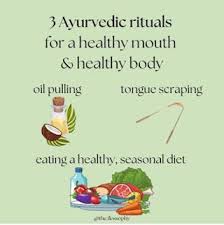Maintaining good oral hygiene is essential for overall health, and Ayurvedic oral health and hygiene practices offer a natural and effective solution. Using ancient techniques like oil pulling and herbal brushing, Ayurveda helps prevent gum disease, cavities, and bad breath—without synthetic chemicals.
In this post, we’ll explore Ayurvedic oral health and hygiene practices that can help you keep your mouth clean, breath fresh, and gums strong—naturally.
🦷 The Importance of Oral Health in Ayurveda
In Ayurveda, the mouth is the gateway to the body. A clean, well-maintained mouth supports digestion, prevents diseases, and boosts immunity. According to Ayurvedic texts, imbalances in the doshas—Vata, Pitta, and Kapha—can lead to oral issues like dry mouth, bleeding gums, tooth decay, and bad breath.
🌿 1. Ayurvedic Oral Health and Hygiene: Oil Pulling (Gandusha or Kavala)
One of the most widely practiced Ayurvedic oral hygiene techniques is oil pulling. Swishing oil in the mouth helps draw out toxins, strengthens gums, and improves overall oral cleanliness. Benefits of Oil Pulling – NIH Study
Recommended oils for oil pulling:
- Sesame oil – Best for Vata dosha
- Coconut oil – Cooling for Pitta dosha
- Mustard oil – Beneficial for Kapha dosha
How to do it:
Take 1 tablespoon of oil, swish for 10–15 minutes, then spit it out. Do this daily before brushing.
🌱 2. Herbal Tooth Powders and Pastes
Ayurveda promotes the use of herbal tooth powders made from ingredients like:
- Neem (Azadirachta indica) – antibacterial, reduces plaque
- Clove (Laung) – relieves tooth pain
- Triphala – prevents gum diseases
- Babool bark – strengthens teeth
You can either make your own powder or buy Ayurvedic toothpaste from trusted brands like Patanjali, Dabur, or Himalaya.
👅 3. Tongue Scraping (Jihwa Prakshalana)
A daily tongue scraping routine removes toxins, bacteria, and food residue that cause bad breath.
Benefits:
- Enhances taste perception
- Reduces coating on the tongue
- Improves digestion
Use a copper or stainless-steel tongue scraper every morning.
🪥 4. Brushing with Herbal Sticks (Dantun)
In ancient India, twigs from certain trees were used as toothbrushes. These dantuns are naturally antibacterial and biodegradable.
Common herbal sticks:
- Neem
- Licorice (Mulethi)
- Arjuna
- Babool
Chewing these sticks also massages the gums and strengthens teeth.
🧘♀️ 5. Diet and Lifestyle for Oral Hygiene
An Ayurvedic diet rich in fiber, seasonal fruits, and warm water supports oral health. Avoid excessively sugary, sour, or salty foods that disturb the Pitta and Kapha doshas.
Tips:
- Rinse mouth after meals with warm water
- Avoid smoking and tobacco
- Massage gums with sesame oil twice a week
📝 Conclusion
By following Ayurvedic oral health and hygiene practices like oil pulling, herbal brushing, tongue scraping, and mindful eating, you can maintain a healthy mouth naturally—without relying on chemical-based products.
Switch to an Ayurvedic dental routine and feel the difference in your breath, smile, and overall wellness.



